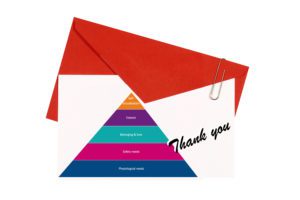
How can a simple gesture give work more purpose?
How can a simple gesture give work more purpose? 1. Send a note: This past
“That guy may be an expert but he’s not a people-person! Last week he lost us a massive opportunity because he was a bit too, hmm, lets say ‘forthright’, in articulating his assessment of a major risk factor on a client project.” Across the desk sat a red-faced HR Business Partner from a global professional services firm. “And it’s not the first time. The boss is livid and says we have to fix him now.”
This story is from a client of ours that has a large team of technical specialists who are essential to scoping and innovating solutions that generate most of the dollars. “These nerdy specialists sometimes come across as having zero interpersonal skills,” the HR partner continued, “and we’ve not yet found a way to change that effectively.”
At Dramatic Difference we work with lots of specialists: lawyers, engineers, researchers, analysts, techies, and number-crunchers of every type. And, in our experience, ‘nerds’ are well able to become interpersonally effective, and quite quickly. But it starts with how those skills are taught.
Many technical experts have a baked-in preference for the ‘scientific method’. Presented with the findings of a psychometric model, for example, they will always ask about its validity (face validity, repeat test validity, norm group, etc) and, if satisfied, happily explore it, search for data points that resonate, test it empirically, and internalise it effectively. A nerd will discard prior strategies when they are found to be obsolete… whereas we often find that a people person holds tightly to what feels intuitively right and can struggle to accept and work with what feels new, strange and clumsy.
Prof. Alvin Toffler of Cornell University has said “The illiterate of the 21st century will not be those who cannot read and write, but those who cannot learn, unlearn, and relearn.” Those with a natural bent towards logic, data and reason are often very adept at unlearning. They will jettison what doesn’t work in favour of new approaches that clearly do.
Okay, I need to ‘fess up here… There’s a big streak of nerd in me too. Like many other nerds, I enjoy using my cognitive strengths (e.g. Curiosity, Critical Thinking, Love of Learning) more than my ‘heart’ strengths (e.g. Love, Kindness, Fairness, Gratitude etc). Although I have strong intuition, and can have good insight into people and situations, I can’t always respond effectively or appropriately in the moment. When I act without being mindful, I tend to prioritise (my perception of) objective truth over my interpersonal impact. Indeed, I can relate to the HR Business Partner’s story above, because I’ve behaved like that myself.
Like many nerds, I can easily get carried away with an idea or an interesting concept. But, when you know how, it’s actually quite easy to redirect my thoughts or attention, or help me reframe and refocus on relationships. This skill goes to the heart of how, at Dramatic Difference, we help turn a ‘geeky expert’ into a ‘people person’.
My business partner and I share a belief in focusing on strengths-based leadership behaviours as a way to develop High Performance People. Sometimes she will jokingly say, “Okay, talk nerdy to me”. Because I know that Humour is a signature strength of hers, I can take the offer the way it is meant — as an invitation to share the deeper research behind the ideas that I’m currently exploring. Having accepted her invitation, I’ll try to use language and illustrations that fit more closely with the way she processes information and concepts.
These are interpersonal strengths and skills at play between two people with different styles of thinking, feeling and perceiving. It’s underpinned by mutual trust and respect, and a belief in enabling each other’s strengths. It’s work — but it’s deeply satisfying (and commercially rewarding) to know how to be inclusive of our diversity.
In my last blog I spoke about ‘flow’ — the quiet contentment and energy that comes from expressing one’s signature strengths. In addition to flow, the use of signature strengths also generates positive emotions (happiness, contentment, enthusiasm, passion…), which in turn fire up all the higher-level cognitive functions that help us solve problems, build trust, develop resilience, and express zest, optimism and well-being. With feedback and support from those around us, we can simultaneously express our strengths and ensure we keep them at the right level to sustain positive relationships (not under/over expressed). High performance teams know how to activate, and moderate, each other’s strengths.
Instead of treating nerds as failures we need to “fix” because they just don’t “get” interpersonal skills, we activate the strength of the nerds in a learning environment. We share well-researched models, neuroscientific vocabulary and replicable techniques. We combine these into well-crafted exercises that allow them to experiment — often with our actors as counterparts, to give precise and accurate feedback.
Using this approach with ‘technical expert’ cohorts triggers their tremendous curiosity, critical thinking and enthusiasm for exploring new concepts through playful experimentation.
So, don’t write off the nerds in your organisation. Invite them to play instead!
Please do comment on this blog – we welcome your feedback and questions.
And if you’d like to talk to us about this blog or any other aspect of developing high performance people, you can reach us on +852 3481 3473 or through [email protected]

How can a simple gesture give work more purpose? 1. Send a note: This past


Which Witch Will YOU Stop Ducking? Last week I saw a wonderful post on Facebook


(…or how to stop hating your co-workers) Sometimes it happens like this: you’re merrily going